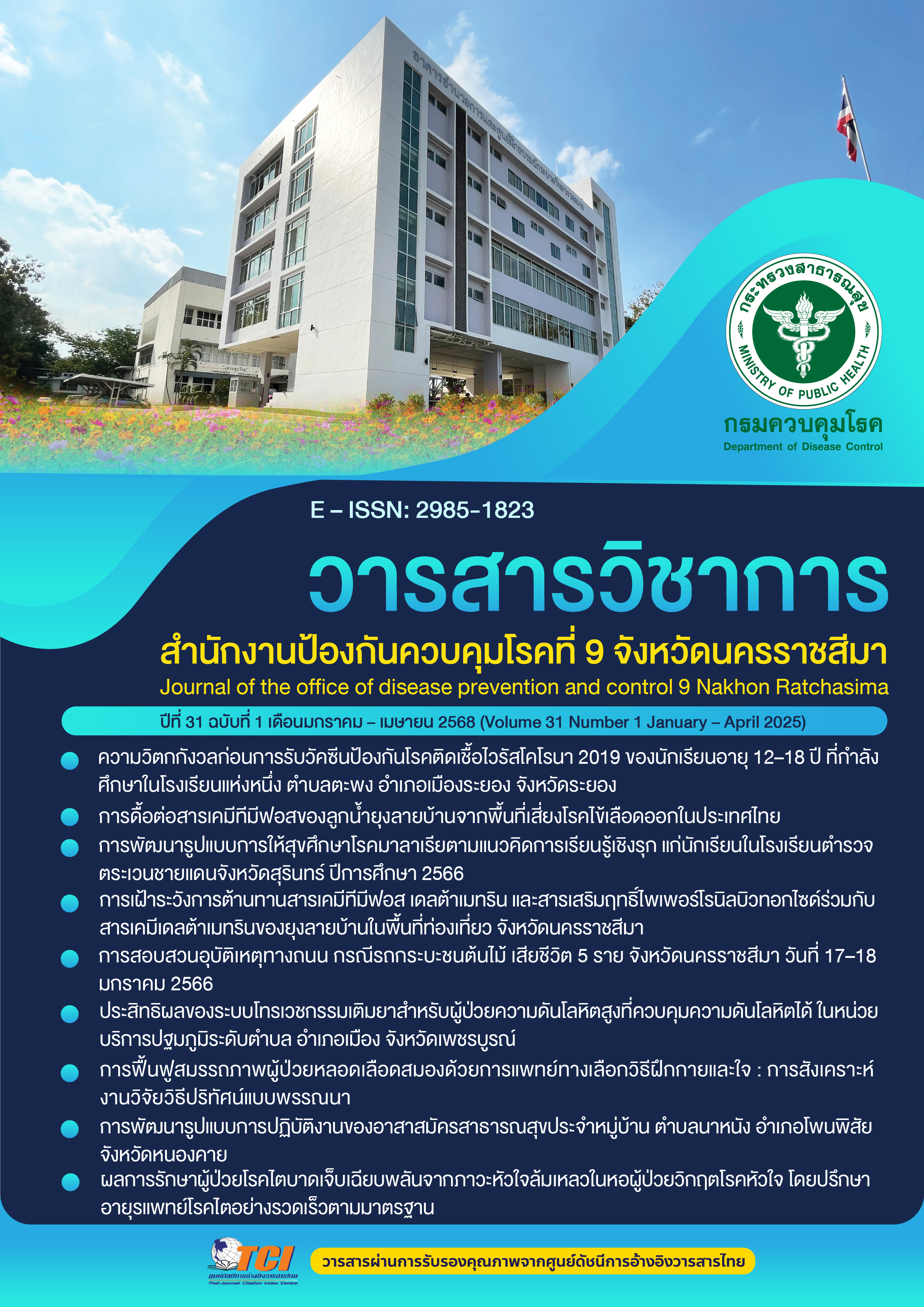Anxiety before Receiving Coronavirus 2019 Vaccine among Students Aged 12–18 Years Old Studying at a School in Taphong Sub-district, Mueang Rayong District, Rayong Province
Keywords:
Anxiety, Coronavirus 2019 Vaccine, StudentsAbstract
This cross-sectional survey research aimed to investigate the level of anxiety and factors associated with anxiety prior to receiving the coronavirus 2019 vaccine among students aged 12–18 years old enrolled in a school in Taphong Sub-district, Mueang Rayong District, Rayong Province. The target group consisted of 204 students. Data were collected from August to September 2022 using a questionnaire comprising three sections: personal factors, information about the coronavirus 2019 vaccine, and anxiety levels concerning vaccination. The data were analyzed using descriptive statistics, including frequency, percentage, mean, and standard deviation. Inferential statistics were also applied, including the chi-square test, odds ratio (OR), and 95% confidence interval (CI). The results showed that most participants were female (58.82%) with an average age of 16.33±9.76 years. Most were studying in lower secondary school (47.06%) and living with their parents (61.76%). A large proportion had no underlying diseases (87.75%) and no history of drug, food or vaccine allergies, repoerted at 96.08%, 94.61%, and 96.08%, respectively. Additionally, 82.84% had no history of illness within the preceding 14 days. Online social media was the primary source of vaccine-related information for most participants (70.21%). A high proportion (79.90%) reported anxiety prior to vaccination. The top three issues contributing to high levels of anxiety among participants were family or parents (22.70%), followed by the impact on daily life (9.20%) and potential side effects or adverse reactions (4.29%). Moreover, a significant association was found between a history of influenza-like illness within 14 days and anxiety prio to vaccination (OR = 4.95, 95% CI = 1.14–21.56, p < 0.05). Therefore, providing accurate and relevant information about the coronavirus 2019 vaccine is crucial for addressing anxiety among students and parents, particularly those with a recent history of influenza-like illness, to ensure they gain accurate knowledge and understanding. Furthermore, the preparedness of healthcare staff and emergency services at vaccination sites is essential to minimizing anxiety about the coronavirus 2019 vaccine.
References
กรมควบคุมโรค. แนวทางการให้วัคซีนโควิด 19 ในสถานการณ์ระบาด ปี 2564 ในประเทศไทย ฉบับปรับปรุงครั้งที่ 2. นนทบุรี: กรมควบคุมโรค; 2564.
McIntosh K. Coronavirus disease 2019 (COVID-19) [Internet]. California: Wolters Kluwer [cited 2020 Feb 26]. Available from: https://www.uptodate.com/contents/coronavirus-disease-2019-covid-19
Heymann DL, Shindo N. COVID-19: What is next for public health? Lancet 2020;395(10224):542–5.
สุกฤตา ตะการีย์, อรทิพา ส่องศิริ, สุสารี ประคินกิจ, รัตนาภรณ์ นิวาศานนท์, พาจนา ดวงจันทร์. ปัจจัยที่มีความสัมพันธ์กับความวิตกกังวลในการรับวัคซีนป้องกันโควิด 19.วารสารวิจัยสุขภาพและการพยาบาล. 2566;39(1):89–99.
ภาสสีห์ ปรีชาภรณ์. ปัจจัยที่ส่งผลต่อการตัดสินใจยอมรับวัคซีนป้องกันโรคติดเชื้อไวรัสโคโรนา 2019 ที่จัดหาโดยภาครัฐ ในเขตพญาไท กรุงเทพมหานคร [วิทยานิพนธ์เศรษฐศาสตรมหาบัณฑิต]. กรุงเทพฯ: มหาวิทยาลัยธรรมศาสตร์; 2564.
Daniel WW. Biostatistics: a foundation for analysis in the health sciences. 7th ed. New York: John Willey and Sonc; 1999.
Taylor S, Landry CA, Paluszek MM, Rachor GS, Asmundson GJG. Worry, avoidance, and coping during the COVID-19 pandemic: a comprehensive network analysis. J Anxiety Disord 2020;76: 102327.
กรมสุขภาพจิต. คู่มือการดูแลสังคมจิตใจบุคลากรสุขภาพในภาวะวิกฤติโควิด-19. นนทบุรี: กรมสุขภาพจิต; 2563.
Jeyanathan M, Afkhami S, Smaill F, Miller MS, Lichty BD, Xing Z. Immunological considerations for COVID-19 vaccine strategies. Nat Rev Immunol 2020;20(10):615–32.
Polack FP, Thomas SJ, Kitchin N, Absalon J, Gurtman A, Lockhart S, et al. Safety and Efficacy of the BNT162b2 mRNA Covid-19 Vaccine. N Engl J Med 2020;383(27):2603–15.
The U.S. Food and Drug Administration. Fact Sheet for Healthcare Providers Administering Vaccine Emergency Use Authorization (EUA) of The MODERNA COVID-19 Vaccine to Prevent Coronavirus Disease 2019 (COVID-19) in Individual 18 Years of Age and Older. Maryland: The U.S. Food and Drug Administration; 2020.
อธิวัฒน์ กุลบุตร, ณัฐพล ลาวจันทร์, สุพล วังขุย, อนุพันธ์ สุวรรณพันธ์. ความรู้ ความคิดเห็นเกี่ยวกับวัคซีนโควิด-19 และการตัดสินใจรับวัคซีนของเจ้าหน้าที่ผู้ปฏิบัติงานในท่าอากาศยานนานาชาติอู่ตะเภาระยอง-พัทยา จังหวัดระยอง. ศรีสะเกษ: มหาวิทยาลัยราชภัฏศรีสะเกษ; 2565.
El-Shabasy RM, Nayel MA, Taher MM, Abdelmonem R, Shoueir KR, Kenawy ER. Three waves changes, new variant strains, and vaccination effect against COVID-19 pandemic. Int J Biol Macromol 2020;204:161–8.
Kaewkrajang P, Jatchavala C, Sangsuwan T. Anxiety, optimism, and COVID-19 vaccine hesitancy among students in a university in southern Thailand during the 2021 academic year. Vaccines 2023;11:1157.
สุชิต แสนเภา. ปัจจัยที่มีผลต่อการตัดสินใจของผู้ปกครองในการฉีดวัคซีนโควิด-19 แก่เด็กอายุ 6 เดือนถึง 4 ปี ในโรงพยาบาลจัตุรัส จังหวัดชัยภูมิ.ชัยภูมิเวชสาร 2566;43(2):86 – 95.
สมาคมโรคติดเชื้อแห่งประเทศไทย. คำแนะนำในการรับวัคซีนในผู้ใหญ่ในช่วงที่มีการระบาดของ COVID-19. กรุงเทพฯ: สมาคมโรคติดเชื้อแห่งประเทศไทย; 2564.
Klimek L, Bergmann KC, Brehler R, Pfützner W, Zuberbier T, Hartmann K, et al. Practical handling of allergic reactions to COVID-19 vaccines. Allergo J Int 2021;30(3):79–95.
สรรเสริญ อุ้ยเอ้ง. ปัจจัยที่มีผลต่อการตัดสินใจฉีดวัคซีนป้องกันโรคโควิด-19 เข็มกระตุ้น (เข็ม 3) ของผู้สูงอายุ ในเขตอำเภอเมือง จังหวัดสงขลา. สงขลา: โรงพยาบาลสงขลา; 2565.
กมลพร แพทย์ชีพ, กันตภณ เชื้อฮ้อ, ปริญญาภรณ์ ธนะบุญปวง, นงนุช วงศ์สว่าง. ปัจจัยทำนายการตัดสินใจรับวัคซีนป้องกัน COVID-19 ของประชาชนในเขตสุขภาพที่ 5. ราชบุรี: วิทยาลัยพยาบาลบรมราชชนนี ราชบุรี; 2565.

Downloads
Published
How to Cite
Issue
Section
License
Copyright (c) 2025 The office of disease prevention and control 9th Nakhon Ratchasima

This work is licensed under a Creative Commons Attribution-NonCommercial-NoDerivatives 4.0 International License.
บทความที่ลงพิมพ์ในวารสารวิชาการสำนักงานป้องกันควบคุมโรคที่ 9 จังหวัดนครราชสีมา ถือว่าเป็นลิขสิทธิ์ สำนักงานป้องกันควบคุมโรคที่ 9 จังหวัดนครราชสีมา



